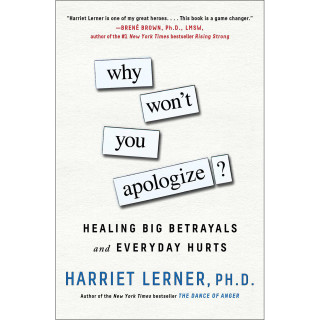How to Deal with Critical People and Messy Fights
When someone's criticizing your behavior, how do you keep yourself from reacting with anger and defensiveness? Here, Dr. Harriet Lerner shares some strategies that work.

Photo: Marko Geber/Getty Images
No one likes being on the receiving end of criticism, but we can't avoid it. People are bound to criticize us for the same reasons we criticize them. They may feel badly about themselves and reflexively get judgmental or lash out. They may have a misguided wish to be helpful and contribute to our betterment. Or we have a trait, quality or behavior that bothers them enough that they really do need to talk about it—or it will affect the relationship.
Here are 12 points to keep in mind when that angry or critical person approaches you.
1. Recognize your defensiveness. We are wired to go immediately into defensive mode when criticized. Becoming aware of our defensiveness can give us a tiny, crucial bit of distance from it. We are listening defensively when we listen for what we don't agree with. Catch yourself when you are focusing on the inaccuracies, distortions and exaggerations that inevitably will be there.
2. Breathe. Defensiveness starts in the body, making us tense and on guard, unable to take in new information. Do what you can to calm yourself. Take slow and deep breaths.
3. Listen only to understand. Listen only to discover what you can agree with. Do not interrupt, argue, refute or correct facts, or bring up your own criticisms and complaints. If your points are legitimate, that's all the more reason to save them for a different conversation, when they can be a focus of conversation and not a defense strategy.
4. Ask questions about whatever you don't understand. When the criticism is vague ("I feel you don't respect me"), ask for a concrete example. ("Can you give me another example where you felt I was putting you down?") This will add to your clarity and show the other party that you care about understanding her. Note: Asking for specifics is not the same thing as nitpicking—the key is to be curious, not to cross-examine. Don't act like a lawyer, even if you are one.
5. Find something you can agree with. You may only agree with 7 percent of what the other person is saying, and still find a point of commonality. ("I think you're right that I was totally hogging the conversation the other night.") If you can't find anything to agree with, thank the other person for their openness and let them know that you'll be thinking about what they've told you.
6. Apologize for your part. It will indicate to the critical party that you're capable of taking responsibility, not just evading it. It will also help shift the exchange out of combat into collaboration. Save your thoughts about their part until later.
7. Let the offended party know he or she has been heard and that you will continue to think about the conversation. Even if nothing has been resolved, tell the other person that she's reached you. ("It's not easy to hear what you're telling me, but I want you to know that I'm going to give it a lot of thought.") Take time to genuinely consider her point of view.
8. Thank the critical person for sharing her feelings. Relationships require that we take such initiative and express gratitude where the other person might expect mere defensiveness. ("I appreciate your telling me this. I know it couldn't have been easy.") In this way, we signal our commitment to the relationship.
9. Take the initiative to bring the conversation up again. Show the other person that you are continuing to think about her point of view and that you are willing to revisit the issue. ("I've been thinking about our conversation last week, and I'm really glad that we had that talk. I'm wondering if there's more you haven't told me.")
10. Draw the line at insults. There may be a time to sit through an initial blast, but not if rudeness has become a pattern in your relationship rather than an uncommon occurrence. Exit from rudeness while offering the possibility of another conversation. ("I want to hear what bothers you, but I need you to approach me with respect.")
11. Don't listen when you can't listen well. It's fine to tell the other person that you want to have the conversation and that you recognize its importance but that you can't have it right now. If you're closing the conversation, suggest a specific window of time to resume it. ("I can't absorb what you're saying now. Let's come back to it tomorrow, when I'll be able to give you my full attention.")
12. Define your differences. You need to tell the critical person how you see things differently, rather than being an overly accommodating, peace-at-any-price type person who apologizes to avoid conflict. Even if the other person isn't able to consider your point of view, you may need to hear the sound of your own voice saying what you really think. Timing is crucial, so consider saving your different point of view for a future conversation when you'll have the best chance of being heard.
Though it is incredibly difficult to sit on the hot seat and dial down our defensiveness, we can learn to listen differently, to ask questions, to apologize for the part we agree with and define how we see things differently. We take turns at being the offender and the offended until our very last breath. It's reassuring to know that we have the possibility to set things straight, or at least to know that we have brought our best selves to the task at hand, however the other person responds.
 Adapted from WHY WON'T YOU APOLOGIZE? by Harriet Lerner, Copyright © 2017 by Harriet Lerner. Reprinted by permission of Touchstone, a division of Simon & Schuster, Inc. Lerner is the author of 12 books, including the New York Times best-selling The Dance of Anger.
Adapted from WHY WON'T YOU APOLOGIZE? by Harriet Lerner, Copyright © 2017 by Harriet Lerner. Reprinted by permission of Touchstone, a division of Simon & Schuster, Inc. Lerner is the author of 12 books, including the New York Times best-selling The Dance of Anger.



